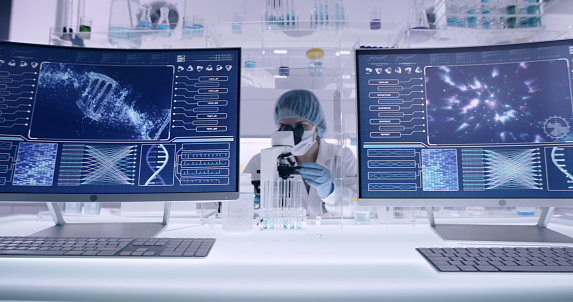Mahool B AnjariyehFounder MBA DNA Consulting, LLC is a renowned DNA expert who helps lawyers and inmates understand and evaluate complex forensic DNA evidence in their cases. In this interview, he shares interesting insights into the world of a forensic DNA consultant.
What does a forensic DNA consultant do?
I work with criminal defense attorneys, civil attorneys, and inmates to help them understand the complex DNA evidence in their cases. I may be hired at any time before trial or in some cases after conviction. My role is to assist in obtaining all the necessary findings related to forensic DNA analysis and its thorough investigation. I then provide my client with an overview of the quality, adequacy, and meaning of the test and its results to determine what can be argued in a court of law regarding the DNA evidence (or lack thereof).
While I do not currently perform laboratory testing, I also assist my clients in making arrangements for DNA testing at accredited private DNA testing laboratories. Sometimes I examine and sample evidence stored in police properties and evidence centers and collect reference buccal swabs from prisoners.
In addition, I sometimes observe laboratory DNA testing, especially when the test consumes evidence.
My work also includes writing reports, statements and direct and cross-examinations for the court. I also appear in court to observe testimony and/or provide expert testimony.
Finally, I am in the business of educating my clients on all things related
DNA evidence in the criminal justice system is based on my past experience working in law enforcement and private forensic DNA testing laboratories.
How did you become interested in forensic science and what is your favorite aspect of this field?
I studied biochemistry at the University of Illinois at Chicago and became fascinated with DNA and molecular biology. My junior year I attended a career fair on campus where the Illinois State Police Crime Lab was exhibiting. I was surprised to learn that civilian scientists worked in the crime lab and became curious about the use of DNA in forensic science. A career in forensic science appealed to me because it did not involve exclusively laboratory work. I understood that going to the crime scene and testifying in court is also involved.
Not long after I was introduced to the field, the OJ Simpson case blew up, bringing widespread exposure to forensics and DNA analysis. I was particularly impressed with the science that some of the lawyers in the case seemed to possess.
My favorite aspect of the forensic science major is probably the importance of the work and the impact it has on people’s lives.
What is the most rewarding aspect of work for you?
Since a large part of my consulting is education, it is very rewarding when my clients begin to understand and become more comfortable with DNA evidence and can effectively advocate for their client (or themselves). i know
The prosecution has its own experts in state crime labs, but the defense must rely on independent experts. As such, I fill a niche that most scholars are probably not interested in, as the defense is often unfairly stigmatized in the criminal justice system.
What was the most memorable case you worked on and why is it important to you?
I was involved in a murder case where the defendant had been tried twice before and was now representing himself. The first was an illegal trial and the conviction was overturned in the second. I started retesting items as well as testing untested items. The new DNA results were favorable.
The defendant obtained superior counsel for the third trial, but another suit was settled. Finally, in the fourth court, the accused was acquitted. My role in these two trials was as an expert witness and counsel to the lawyer on the questioning of witnesses.
This case emphasized the importance of caution in DNA research, the importance of persistence, and the importance of a good lawyer.
Recently, I had the privilege of participating in a post-conviction case where the conviction was overturned.
In your opinion, what are the most common uses of DNA in forensic medicine?
Inclusion and exclusion of individuals as possible DNA sources based on evidence in criminal and civil cases.
Database searches such as: traditional FBI Combined DNA Index System (CODIS) searches; CODIS Family Search. and more recently forensic genetic genealogy.
Investigation of missing persons
paternal
What are some of the main concerns you face in DNA collection and management?
As the sensitivity of DNA testing increases, it is important to identify potential DNA evidence. Most of the evidence tested these days has no visible or identifiable body fluids on it. Instead, the detection of trace DNA on items that a person may have come in contact with represents a high percentage of samples that pass the crime lab. As such, researchers must be informed and creative when deciding what to collect or where to sample. At the same time, stricter contamination prevention protocols are necessary when collecting evidence because DNA testing is so sensitive.
In addition to advances in post-collection DNA testing, there have been interesting advances in the collection process itself. To have the best chance of obtaining an interpretable result, it is important to obtain as much DNA as possible from a case of evidence. For example, the M-Vac is essentially a wet-vacuum DNA collection device that produces a much larger amount of DNA from certain surfaces (eg large, porous cases) than standard swabbing and cutting sampling methods.
What do you think are the most important areas of forensic DNA research and development today?
Overcoming confirmation and other biases when analyzing evidence.
Dealing with complex DNA mixtures and low-level results.
The best ways to convey scientific findings to the jury
Determining the actual body fluid responsible for the DNA in an item.
Streamlining next-generation sequencing technologies in crime labs.
Continue to develop forensic genetic genealogy in a responsible manner.

